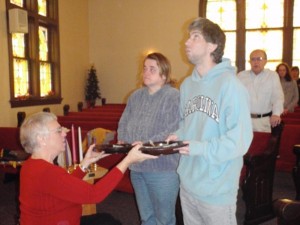If the Rev. Sue Montgomery had her way, the service she leads on Sunday mornings at Nickleville Presbyterian Church would include the same people she ministers to on Tuesday mornings. But for one reason or another, that’s just not possible at this time. Through it all, however, Montgomery has put together a lasting ministry that will have a long-term effect.
For the last seven years, Montgomery has been leading a service on Tuesday mornings that affirms the men and women who live with developmental disabilities and also live in area group homes. Attendance in worship varies due to the medical, emotional and personal needs of the ones who participate.

The Rev. Sue Montgomery hands out the offering plates during one of her Tuesday morning services that regularly includes about a dozen men and women with developmental disabilities from the Nickleville area.
Still, Nickleville hosts around a dozen people with disabilities plus their staff support on Tuesdays. They come from approximately 18 different homes in the area staffed and supervised by the group home provider Training Toward Self Reliance. The participants in worship travel from as far away as 30 miles to worship together and grow in faith. All told, TTSR supports 50 or more persons who live with developmental disabilities. While the variety of gifts brought to worship are many, due to the varying levels of disability not all can attend every week, and certainly not all at one time.
“It’s an interesting ministry; it’s always evolving,” said Montgomery, who due to a degenerative bone issue uses a wheelchair for mobility. “You never know what’s gonna happen. It’s where I find myself spiritually fed because you see the eyes open, you see the joy, you see the tears, you see the questions.”
Having separate services for the Tuesday group and the Nickleville congregation – which also numbers around 30 on Sundays – is not ideal for Montgomery, but it’s the way it has to be right now.
“I’d like to integrate the men and women into worship in the community, but there is no way a smaller membership congregation can integrate 20-30 persons with developmental disabilities in a Sunday morning worship,” Montgomery said. “It’s just not realistic. And I am totally, totally not supportive of segregated ministries of having people at worship on Sunday and people with disabilities in worship on Tuesday in a separate setting.
“People with disabilities can be integrated. If we have a family member born with a disability, we don’t segregate them at Thanksgiving and Christmas dinners and at worship, we don’t segregate them into special areas of the house. If we have a family member who has a disability they’re integrated in every way into the home. The church family needs to be thinking of that in the same way, that people with developmental disabilities or any disability can be integrated into the working ministry of the church.”
 Montgomery also admitted that some people with developmental disabilities want to worship with people who are “like them.” That causes a conflict of mindset for Montgomery, she’ll confess. Many of the residents have also been rejected from churches because of their disruptive nature, leaving them with no other place to worship.
Montgomery also admitted that some people with developmental disabilities want to worship with people who are “like them.” That causes a conflict of mindset for Montgomery, she’ll confess. Many of the residents have also been rejected from churches because of their disruptive nature, leaving them with no other place to worship.
Unfortunately, that is only part of the negative atmosphere surrounding these disabled men and women. Many have been told biblical lies about the origins of their disabilities.
“There are many underlying misunderstandings that shape how people are treated and are excluded that we aren’t always aware of,” Montgomery explained. “Congregations do unbelievably think a person with a disability has a disability as a result of sin. Or they have something that God is punishing them for, or if they would have prayed more or trusted in Jesus more they would be healed. And we still have a lot of that ancient thinking and understanding of disability guiding people’s thoughts and actions.
“A lot of these young men and women have been told that God made them the way they were because God loved them. That is probably one of the most painful things you could ever, ever express to someone with a major disability. It just destroys any foundation for faith. … It’s spiritual abuse. And we have an opportunity to put an end to that and to create a healthy spiritual relationship with God.”
Montgomery realized there was a need for this type of ministry through one of her church members at the Nickleville church who also worked at the Training Toward Self Reliance group home provider. Some members of TTSR had been taking residents to church but were being told not to return because the disabled men and women were a distraction. Montgomery was asked if she could hold a service for TTSR. She agreed, and her Tuesday morning ministry was born, but it has had plenty of bumps in the road.
Because the disabled worshippers must rely on staff from their homes to get to Nickleville PC, circumstances sometimes prevent them from making the trip. Some days the disabled person isn’t having a “good” day and is kept away. Sometimes the staff just doesn’t want to make the effort to bring their residents. There’s also another underlying factor that can hamper attendance on Tuesdays.
“Many of the staff are not church-oriented, have no church experience, church is not a priority,” Montgomery said. “And if church isn’t a priority of the staff, the men and women who are in their care won’t get their spiritual needs met. If it’s not a priority of the staff, the person, if she wants to go to church and the staff doesn’t feel like it or the staff says ‘We don’t have enough gas to go,’ she isn’t going to go. … If the staff isn’t committed to meeting the spiritual needs of the men and women in their care, it’s not going to happen.”
 As for Sundays, homes generally have reduced staff on the weekends, further complicating transportation and making it nearly impossible for them to come on a Sunday morning. These are things Montgomery battles on a weekly basis, but it is not deterring her from keeping the Tuesday morning service alive and well.
As for Sundays, homes generally have reduced staff on the weekends, further complicating transportation and making it nearly impossible for them to come on a Sunday morning. These are things Montgomery battles on a weekly basis, but it is not deterring her from keeping the Tuesday morning service alive and well.
While Montgomery would love to have the worshippers on Tuesday mornings congregate with those at Nickleville on Sunday mornings, she understands the difficulties and challenges surrounding that. The men and women who range in age from 20-30 live in varying places on the autism spectrum and with various levels of developmental disabilities. Some of the men and women demonstrate behaviors that require understanding, redirection and patience. Behaviors can be difficult to understand. The group home staff seeks to nurture appropriate behaviors, self-esteem and integration into the community, which begins in the group home family setting.
“Some of the men and women, their behaviors are really difficult, which is why they’re in the group homes where they are,” Montgomery explained. “And integrating them into worship on Sunday is not always going to be a reality. Even the most loving and caring congregations will struggle with some of the behaviors that we have.”
The Tuesday service includes the same order of worship as Sunday mornings, and that’s by design.
“My focus here is that it is not special,” Montgomery said. “It is adapted to what is appropriate for the people who are there. The big difference is excitement and animation. It’s less formal, there’s no doubt about that. We re-enact the scriptures with them.”
 Some of the men and women with disabilities will read the scripture, direct the choir, lead the prayers of the people and take the offering. The money from the offering supports the Nickleville area food bank to help feed needy children.
Some of the men and women with disabilities will read the scripture, direct the choir, lead the prayers of the people and take the offering. The money from the offering supports the Nickleville area food bank to help feed needy children.
“They’re getting to do things they would never get to do in the typical church,” Montgomery said. “Their gifts are respected. Their gifts are honored. They pray. They read scriptures. They sing — it may not be on key, it may not be the right words, but they sing with joy and thanksgiving. Their gifts are broad and their commitment to the food pantry has been significant. It’s just a joy to watch it unfold.”
Montgomery’s ability to reach the men and women living with disabilities is far-reaching. Just recently, one man whose mother died let it be known in his own special way that he needed his church to be part of this difficult time.
“Because of financial constraints, there was no funeral, no memorial service, nothing,” Montgomery explained. “He didn’t even go home. For two days, he walked around saying, ‘Prayer. Church. Candle. Pastor Sue.’”
 Knowing this man was seeking spiritual comfort during this trying time, Nickleville and TTSR held a memorial service for the grieving son, with his home’s staff and fellow residents on hand. He was given a prayer blanket and participated in the service.
Knowing this man was seeking spiritual comfort during this trying time, Nickleville and TTSR held a memorial service for the grieving son, with his home’s staff and fellow residents on hand. He was given a prayer blanket and participated in the service.
“That would not have ever happened anywhere else,” Montgomery said. “It would not have happened had it not been for the ministry that we’ve been able to build up over the last seven years.”
Montgomery is also connecting with the group home staff. She has made it mandatory that the staff join in the service, making things like cell phones, texting, coffee and soda prohibited from the sanctuary.
“They don’t have to do anything that’s against their personal belief,” she said, “but if they are working for TTSR, they know their responsibility is to provide support to the individual to attend worship. … Staff is very much a part of worship. It’s a joy to watch as they work one-to-one with the people in their care. Our ministry would be impossible without the dedicated support of the staff.”
In turn, previously unchurched staff members now have a faith community at Nickleville to provide spiritual nurture and support when there is a critical illness or death in their families.
It’s all part of a beautiful ministry that wasn’t being met a decade ago but that is now touching the lives of many people – both people with disabilities and staff – who would not be getting spiritual guidance anywhere else. It’s hard work, but extremely fulfilling. Just ask Sue Montgomery.
“If anybody’s interested in doing this kind of ministry, don’t be afraid,” she said. “Be prepared for what God can do. It’s not easy, but it’s filled with joy because you know that you’re making a difference. You’re touching lives that many times are hurting or filled with questions and pondering.”
And, frankly, that’s what it’s all about.
